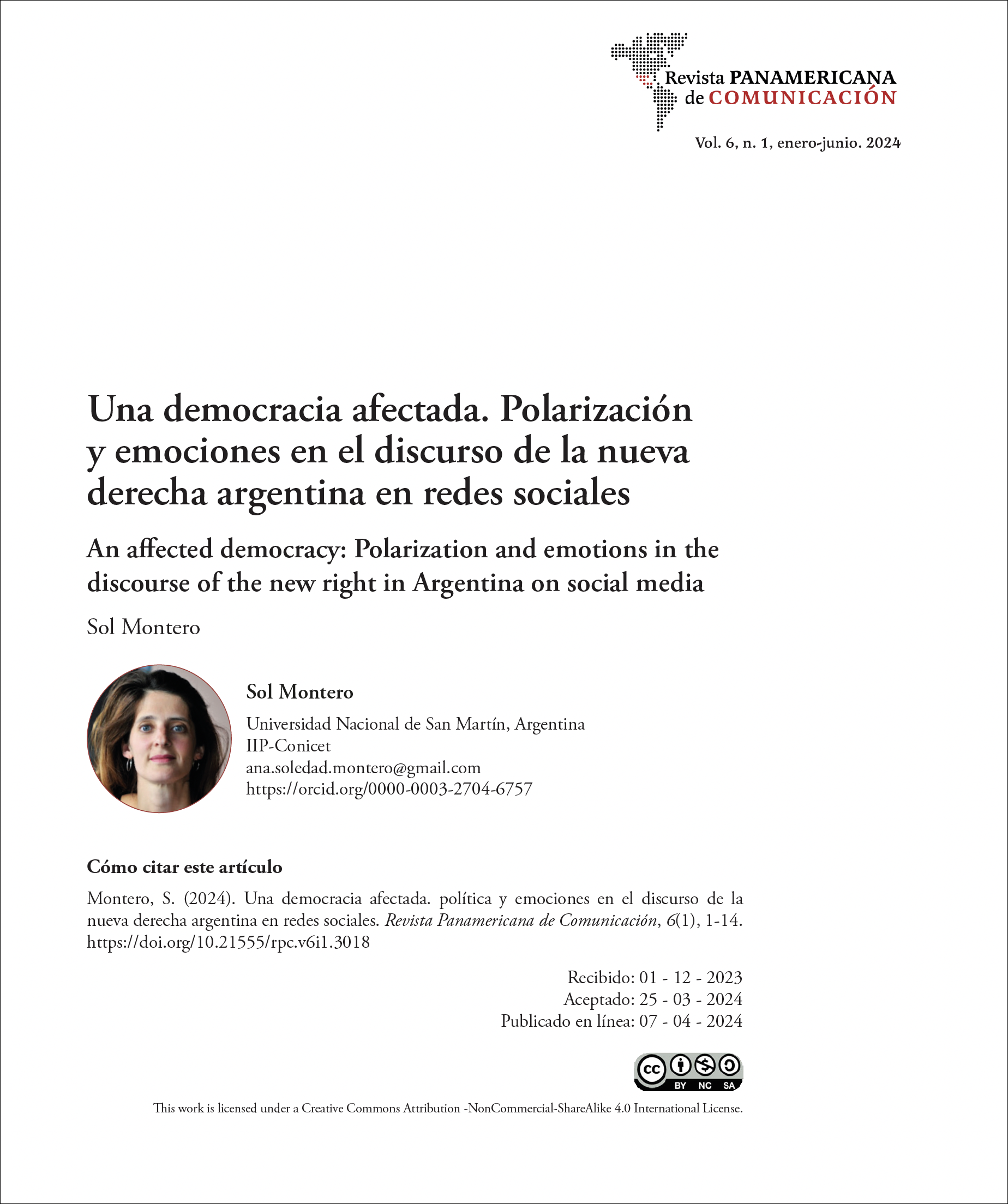An affected democracy: Polarization and emotions in the discourse of the new right in Argentina on social media
Main Article Content
Abstract
The rise of Javier Milei in Argentina occurs in a politically polarized society affected by negative emotions. This paper aims to explore how affect is mobilized and staged on Milei’s social media platforms. Based on fieldwork that collected over a thousand posts from X’s official accounts, Instagram, and TikTok during the presidential campaign (between August and November 2023), an attempt is made to characterize the emotional apparatus deployed by Milei’s accounts on his networks. The mobilization of two emotions is examined: on one hand, resentment (associated with disgust and humiliation) deployed in the interpellations, mentions, and citations on X (formerly Twitter); on the other hand, a series of positive emotions that contribute to identification and the construction of a “we,” mobilized by audiovisual iconography on Instagram.
Article Details
References
Ahmed, S. (2015). La política cultural de las emociones. Mexico: UNAM-Programa Universitario de Estudios de Género.
Arfuch, L. (2016). El “giro afectivo”. Emociones, subjetividad y política. DeSignis, 24, 245-254.
Arnoux, E., & Di Stefano, M. (2018). La dimensión emocional de los discursos. En Identidades políticas. Enfoques retórico-argumentativos. Buenos Aires: Cabiria (pp. 11-38).
Calvo, E., & Aruguete, N. (2020). Trolls, fake news y otros encantos. Buenos Aires: Siglo XXI.
Errejón, I. (2023). La libertad desesperada. Entrevista por Iván Schuliaquer. Revista Anfibia, https://www.revistaanfibia.com/inigo-errejon-la-libertad-desesperada/
Franzé, J., & Melo, J. (2022). Cuando la frontera pasa por el centro crítica del discurso consensualista sobre la polarización. Más poder local, 49, 78-96.
Illouz, E. (2023). La vida emocional del populismo. Buenos Aires: Katz.
Iyengar, S., Lelkes, Y., Levendusky, M., Malhotra, N. & Westwood, S. (2019). The origins and consequences of affective polarization in the United States. Annual Review of Political Science, 22, 129-146. https://doi.org/10.1146/annurev-polisci-051117-073034
Gutiérrez, S., & Plantin, C. (2010). Argumentar por medio de las emociones. La campaña del miedo del 2006. Versión, 24, 41-69.
Kessler, G., & Vommaro, G. (2021). Polarización, consensos y política en la sociedad argentina reciente. Buenos Aires: FUNDAR.
Montero, A.S. 2009. Puesta en escena, destinación y contradestinación en el discurso kirchnerista. (Argentina, 2003-2007). Discurso & Sociedad, 3(2), 316- 347.
Ramírez, I., & Falak, A. (2023). “Te amo, te odio: dame más”. Polarización afectiva en la opinión pública argentina”. Revista SAAP, 17(2), 361-397. https://doi.org/10.46468/rsaap.17.2.a6
Sibilia, P. (2020). El auge de los afectos negativos. Le Monde Diplomatique 255 (septiembre 2020).
Schuliaquer, I., & Vommaro, G. (2020). Introducción: La polarización política, los medios y las redes. Coordenadas de una agenda en construcción. Revista SAAP, 14(2), 235-247. https://doi.org/10.46468/rsaap.14.2.I
Vanoli, H. (17 de octubre 2023). Elecciones 2023. ¿La hora de los que no tienen nada que perder? Sentimientos Públicos. https://sentimientospublicos.com.ar
Vilker, S. (20 de noviembre de 2023). Argentina: Milei acumuló gran capital antipolítico para ganar, ¿cómo hace para gobernar? MediosPublicos.uy, 20 de noviembre. https://mediospublicos.uy/argentina-milei-acumulo-gran-capital-antipolitico-para-ganar-como-hace-para-gobernar
Vommaro, G. (diciembre 2023). La derecha alternativa y el cuerpo del escarmiento. Le Monde Diplomatique, 294.
Waisbord, S. (2020). ¿Es válido atribuir la polarización política a la comunicación digital? Sobre burbujas, plataformas y polarización afectiva. Revista SAAP, 14(2), 248-279. https://doi.org/10.46468/rsaap.14.2.a1
Waisbord, S. (24 de enero de 2024). El presidente troll. Revista Anfibia, 24 de enero. https://www.revistaanfibia.com/milei-el-presidente-troll/
Zuban-Córdoba & Asociados (2023). Informe: Juventudes y elecciones en Argentina. Zuban-Córdoba & Asociados. https://zubancordoba.com/portfolio/informe-juventudes-y-elecciones-argentina-2023


